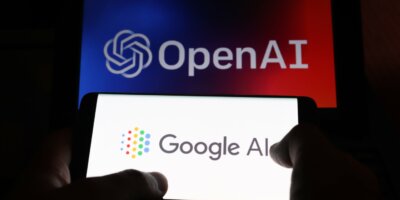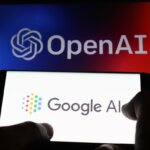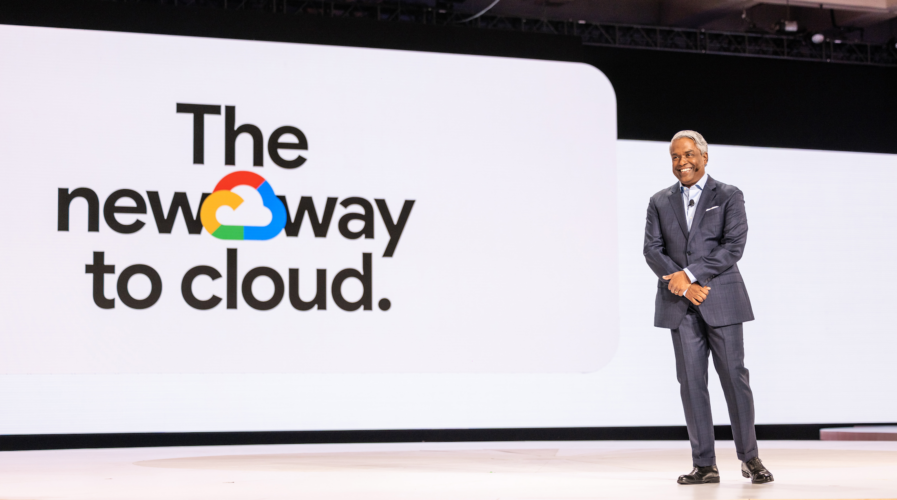
Thomas Kurian, Google Cloud CEO speaking at Google Cloud Next 2023. (image – Google)
Here’s what went down at Google Cloud Next 2023
- Google Cloud announced enhancements to Duet AI and Vertex AI at Google Cloud Next 2023 in San Francisco.
- 70% of generative AI unicorns are using Google Cloud technology.
- Google also announced new digital watermarking tools.
Generative AI remains the topic of the hour, as almost every major tech company continues to announce new applications for it. Naturally, generative AI dominated the announcements at Google Cloud Next 2023.
In his keynote address at the summit, Sundar Pichai, Google’s CEO, said the company has taken an AI-first approach for the last seven years. Pichai also believes that making AI helpful for everyone is the most important way to deliver Google’s mission for the next decade and has invested in the very best tooling, foundation models, and infrastructure.
“Today, we are using generative AI to reimagine experience and take more of the work out of searching. We call this the Search Generative Experience (SGE). SGE uses advanced AI. To help you get the gist of a top generative AI search, we are drawing on years of insights and technology development to harness and deploy AI at scale. Google Cloud is how we provide these same insights, tools and platforms to help you all innovate too,” said Pichai.
At Google Cloud Next, Pichai and Thomas Kurian, Google Cloud’s CEO, announced several new generative AI solutions that are expected to help businesses achieve greater outcomes with AI. Tech Wire Asia takes a look at some of the announcements.
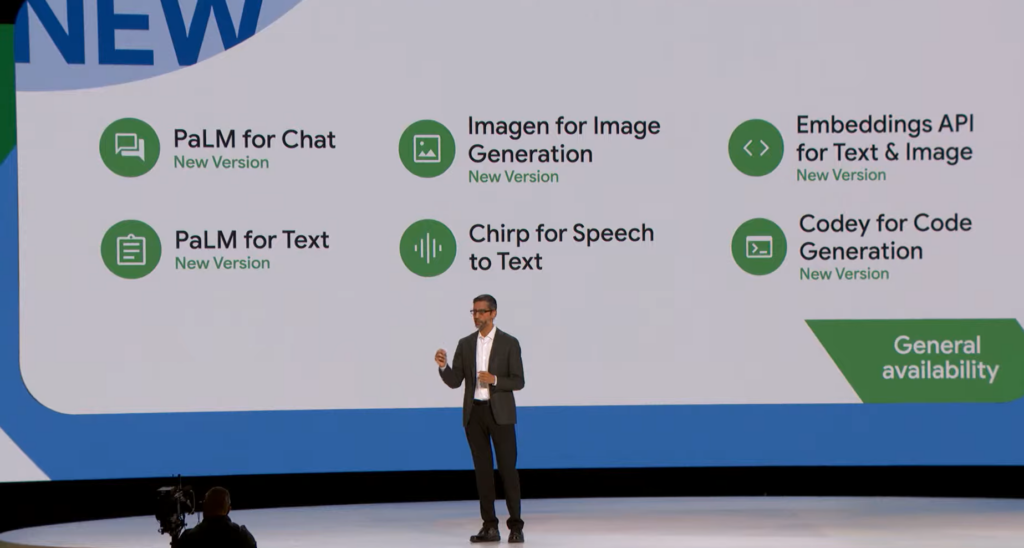
Sundar Pichai, Google CEO speaking at Google Cloud Next 2023.
AI-optimized Infrastructure
When it comes to startups, Google Cloud remains one of the preferred choices for developing AI infrastructure. According to James Lee, General Manager for Startups and AI, Google’s AI-optimized infrastructure is the platform of choice for startups building generative AI. In fact, he mentioned that more than half of all funded generative AI startups are Google Cloud customers, including 70% of generative AI unicorns (those valued at more than US$ 1 billion).
“Startups like Bending Spoons, Faraday, Jasper, Replit and Typeface are helping people utilize generative AI in many of their everyday tasks at work. Important AI tooling applications from Aible, Anyscale, Gitlab, Gretel, Labelbox, Snorkel AI and Weights & Biases are available on Google Cloud to help others build their own generative AI experiences. And important model-builders and researchers like AI21 Labs, Anthropic, Character.AI, Cohere, Midjourney and Osmo are training and developing models utilizing Google Cloud infrastructure, GPUs and TPUs,” said Lee.
As these companies leverage Google Cloud’s AI infrastructure technologies, TPUs and GPUs, Google has announced significant enhancements to them as well at Google Cloud Next.
First, Google Cloud is expanding its AI-optimized infrastructure portfolio with Cloud TPU v5e, the most cost-efficient, versatile, and scalable Cloud TPU to date. TPU v5e offers integration with Google Kubernetes Engine (GKE), Vertex AI, and leading frameworks such as PyTorch, JAX, and TensorFlow, so businesses can get started with easy-to-use, familiar interfaces. Cloud TPU v5e is currently available in public preview in Google Cloud’s Las Vegas and Columbus cloud regions, with plans to expand to other regions, including Google Cloud’s Singapore cloud region later this year.
Google Cloud also announced that its A3 VMs, based on NVIDIA H100 GPUs and delivered as a GPU supercomputer, will be generally available next month to power large-scale AI models. The A3 VM features dual next-generation 4th Gen Intel Xeon Scalable processors, eight NVIDIA H100 GPUs per VM, and 2TB of host memory. Built on the latest NVIDIA HGX H100 platform, the A3 VM delivers 3.6 TB/s of bisectional bandwidth between the eight GPUs via fourth-generation NVIDIA NVLink technology.
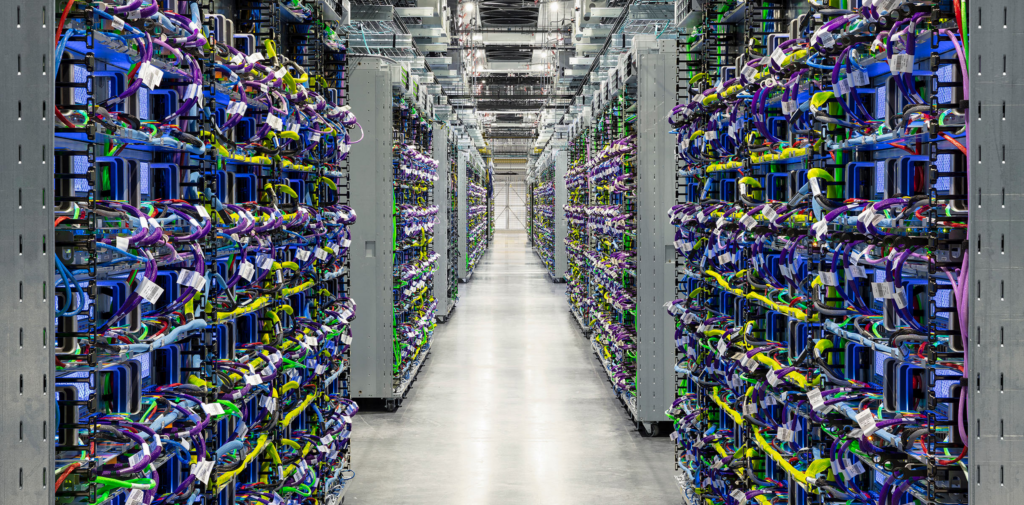
Google Cloud is expanding its AI-optimized infrastructure portfolio with Cloud TPU v5e. (Image – Google)
Duet AI in Google Cloud
Unveiled in May at Google I/O, Duet AI is revolutionizing the way users work with Google Cloud, which will help customers boost their productivity, gain competitive advantages, and ultimately improve their bottom line. At Google Cloud Next, Google announced enhancements to Duet AI for both Google Workspace and Google Cloud.
For Google Cloud, Duet AI can now provide AI assistance across more surfaces, infusing the power of generative AI across the cloud to help with application development, operations, database management and migration, data analysis and visualization, as well as cybersecurity.
“Duet AI in Google Cloud provides expert assistance across your entire software development lifecycle. This includes code generation, source citation, test coverage, designing and publishing APIs, migrating and modernizing applications, and much more.
With Duet AI, developers can use natural language to quickly understand complex code and APIs, follow best coding practices, quickly generate unit tests, and more. Duet AI’s code and chat assistance are available in our development environments such as the Google Cloud console, Cloud Workstations and Cloud Shell Editor,” said Brad Calder, Vice President and GM for Google Cloud Platform and Technical Infrastructure.
Duet AI in Google Cloud announcements include advancements for:
- Software development: Duet AI provides expert assistance across the entire software development lifecycle, enabling developers to stay in a flow state longer by minimizing context switching to help them be more productive. In addition to code completion and code generation, it can assist with code refactoring and building APIs using simple natural language prompts.
- Application and infrastructure operations: Operators can chat with Duet AI in natural language across a number of services directly in the Google Cloud Console, to quickly retrieve “how-to” information about infrastructure configuration, deployment best practices, and expert recommendations on cost and performance optimization.
- Data Analytics: Duet AI in BigQuery provides contextual assistance for writing SQL queries as well as Python code, generates full functions and code blocks, auto-suggests code completions, and explains SQL statements in natural language, and can generate recommendations based on your schema and metadata.
- Accelerating and modernizing databases: Duet AI in Cloud Spanner, AlloyDB and Cloud SQL, helps generate code to structure, modify, or query data using natural language.
- Security Operations: Duet AI is also coming to security products including Chronicle Security Operations, Mandiant Threat Intelligence, and Security Command Center, which can empower security professionals to more efficiently prevent threats, reduce toil in security workflows, and uplevel security talent.
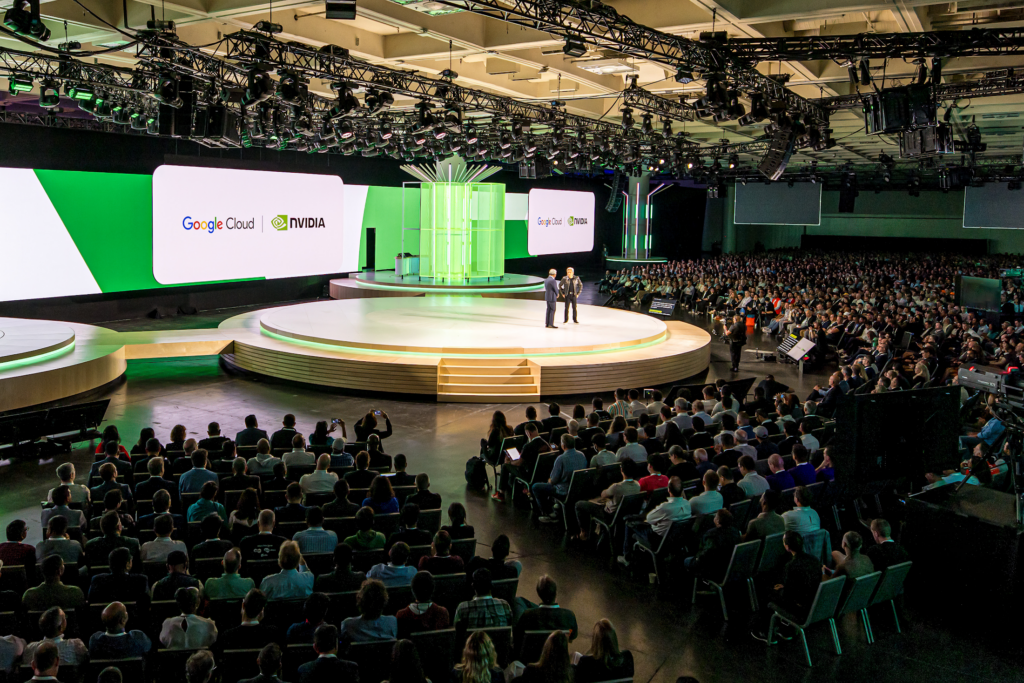
Kurian and NVIDIA’s Jensen Huang at Google Cloud Next 2023. (Image – Google)
Duet AI in Workspace
In Google Workspace, Duet AI has already seen users using the tool as a powerful collaboration partner. As the world’s most popular productivity tool, with over 3 billion users and 10 million paying customers, the enhancements announced at Google Cloud Next on Duet AI in Workspace will enable greater productivity for users.
Enhancements for Duet AI in Google Meet will see the tool taking notes during video calls, sending meeting summaries, and even translating captions into 18 languages automatically , including Simplified Chinese, Traditional Chinese, Indonesian, Thai, and Vietnamese. Duet AI in Meet is also enabling clearer visual and audio through studio look, studio lighting and studio sound.
For Google Chat, users can chat directly with Duet AI to ask questions about content, get a summary of documents shared in a space and even catch up on missed conversations. Google has also refreshed the user interface and enhanced search to allow users to stay on top of conversations.
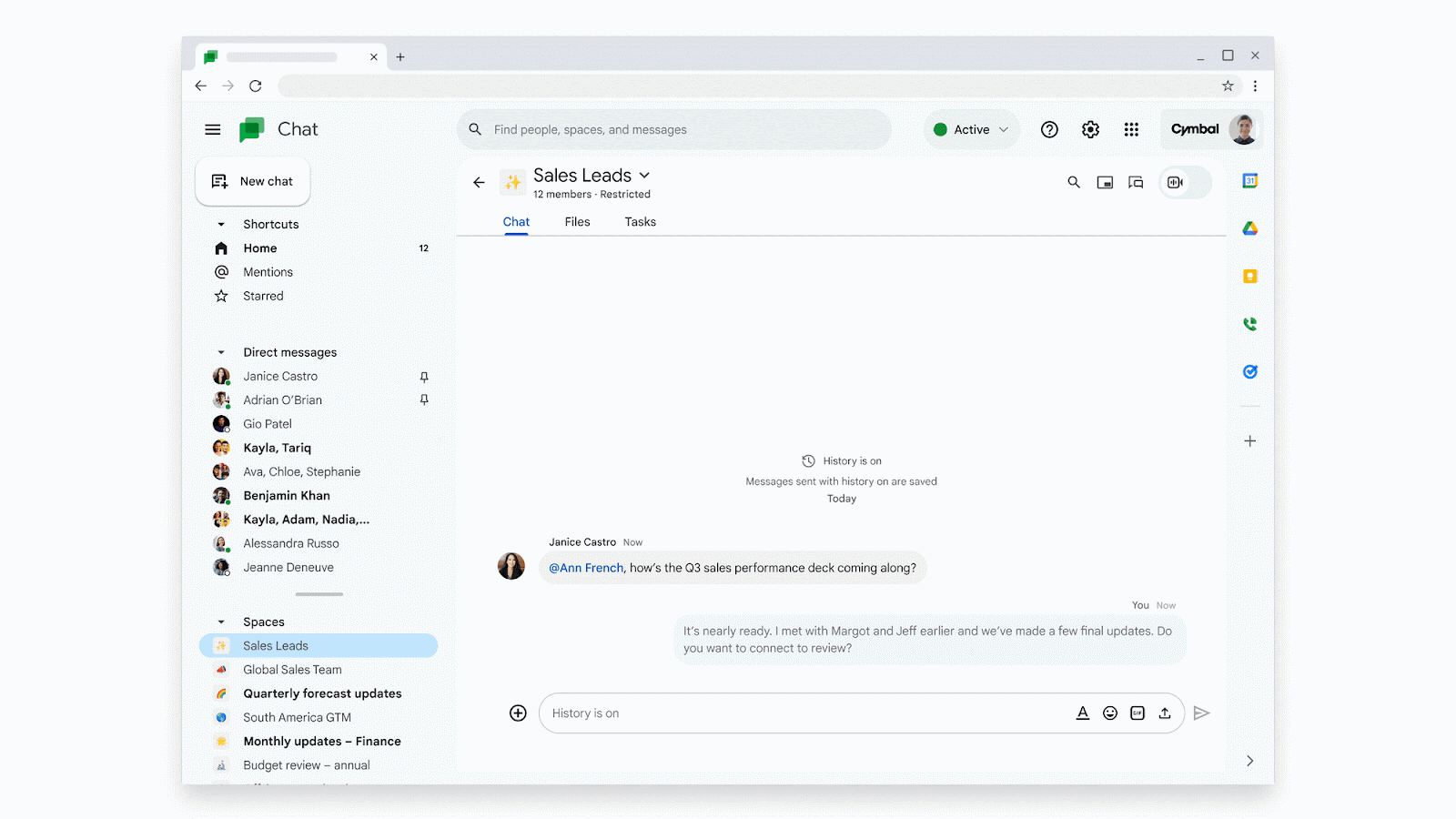
A demo of Duet AI in Google Workspace (Source – Google)
Vertex AI
One of Google Cloud’s gems, Vertex AI continues to be a game-changer in the industry, especially with generative AI now integrated into it. At Google Cloud Next, a variety of announcements were made that expanded Vertex AI’s capabilities.
Firstly, new models in Model Garden further Google Cloud’s ability to provide choice with a diverse and open ecosystem. The new additions include Llama 2 and Code Llama from Meta, along with the Technology Innovation Institute’s Falcon LLM.
Model Garden’s variety lets enterprises match models to their needs, and when customers want full transparency into a model’s weights and artifacts, for instance for compliance and auditing support purposes, open-source options such as Llama 2 and Falcon offer a great choice.
“We know that an organization’s data is one of the most important factors for model performance, which is why we’ve made it easy to tune these models. In fact, we’re the only cloud provider that supports Llama 2 with both adapter tuning and Reinforcement Learning with Human Feedback (RLHF). This allows organizations to tune Llama 2 with their own enterprise data while continuing to maintain full control and ownership of their data,” said Google.
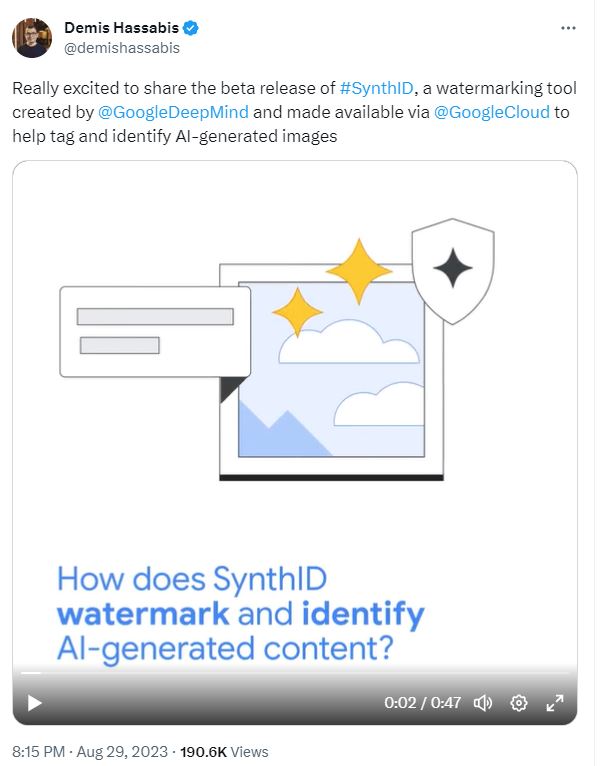
Tweet by Co-Founder and CEO of Google Deep Mind on SynthID
Secondly, Vertex AI sees updates to several first-party foundation models, bringing the deep expertise of Google DeepMind to customers. This includes upgrades to PaLM with higher quality outputs, a 32,000-token context window that analyzes much larger documents, grounding capabilities for enterprise data, and its availability in 38 languages, including Simplified Chinese, Traditional Chinese, Indonesian, Thai, and Vietnamese. Codey, Google Cloud’s model for code generation and chat, now offers better performance, and Imagen, our model for image generation, features improved image quality. Google Cloud is also planning to host its PaLM for Text and Chat models, as well as its Codey model, in its Singapore cloud region later this year.
Taking a step forward towards copyright, Google Cloud also announced a new digital watermarking functionality for Imagen powered by Google DeepMind’s SynthID. The experimental availability of digital watermarking on Vertex AI makes Google Cloud the first hyperscale cloud provider to enable the creation of invisible and tamper-resistant watermarks in AI-generated images.
SynthID is a state-of-the-art technology that embeds the digital watermark directly into the image of pixels, making it invisible to the human eye, and very difficult to tamper with, without damaging the image.
Analytics and database
For analytics and databases, Google Cloud announced enhancements to the following tools:
BigQuery Studio – A single interface for data engineering, analytics, and predictive analysis, BigQuery Studio helps increase efficiency for data teams.
AlloyDB AI – An integral part of AlloyDB, the PostgreSQL-compatible database service, AlloyDB AI offers an integrated set of capabilities for easily building GenAI apps, including high-performance and vector queries.
New partners at Google Cloud Next
Google Cloud Next also saw the announcement of New Data Cloud Partners. The partners, which include Confluent, DataRobot, Dataiku, Datastax, Elastic, MongoDB, Neo4j, Redis, SingleStore, and Starburst, are all launching new capabilities to help customers accelerate and enhance generative AI development with data.
“We are in an entirely new era of digital transformation, fueled by GenAI. This technology is already improving how businesses operate and how humans interact with one another. It’s changing the way doctors care for patients, the way people communicate, and even the way workers are kept safe on the job. And this is just the beginning,” concluded Kurian.
READ MORE
- Safer Automation: How Sophic and Firmus Succeeded in Malaysia with MDEC’s Support
- Privilege granted, not gained: Intelligent authorization for enhanced infrastructure productivity
- Low-Code produces the Proof-of-Possibilities
- New Wearables Enable Staff to Work Faster and Safer
- Experts weigh in on Oracle’s departure from adland





